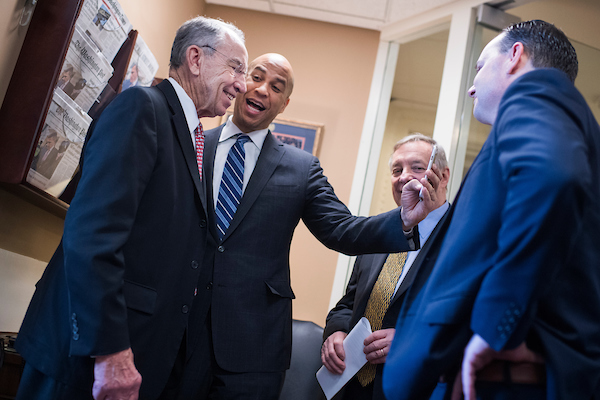House Approves Criminal Justice Overhaul, Sends to President
After years of negotiations and strong bipartisan support, measure headed to enactment

A sweeping criminal justice overhaul is heading to the White House for President Donald Trump’s signature after the House cleared the measure.
The House passed the bill, 358-36, Thursday amid a flurry of other bills approved in a year-end rush.
The measure united a strange group of bedfellows, including Sens. Cory Booker, D-N.J., and Charles E. Grassley, R-Iowa, in the Senate, Jared Kushner at the White House and Reps. Robert W. Goodlatte, R-Va., and Hakeem Jeffries, D-N.Y., in the House.
The Senate passed the measure, dubbed the First Step Act, 87-12 on Tuesday night. It took years of negotiations to put together the compromise bill that made it to the floor in each chamber after the scope of the legislation was narrowed to garner support.
The bill’s main provisions include modest changes to sentencing. It would give judges more freedom to hand down sentences below the mandatory minimum for nonviolent drug offenders. It would reduce mandatory minimums associated with the three-strikes law.
It would eliminate a provision that prosecutors used to “stack” firearm charges for long sentences for first-time offenders. And it makes retroactive a 2010 law that reduced the sentencing disparity between crack and powder cocaine.
On the prison side, the bill would create more job training and drug treatment for inmates, among other changes. The bill would increase direct spending by $346 million over the next 10 years, according to the Congressional Budget Office.
The legislation would prohibit the shackling of pregnant inmates and the use of solitary confinement for juveniles in almost all cases.
Among other provisions, the bill aims to lower the number of federal inmates through changes in some sentencing laws and through better support for prisoners returning to society so they don’t commit new crimes and return to prison.
The Senate approved an amendment by voice vote that included language to keep violent offenders from being released early. Sen. Ted Cruz, R-Texas, insisted on that provision, which was inadvertently left out of the bill, as well as language from Sen. James Lankford, R-Okla., to clarify language about faith-based groups, according to Senate Minority Whip Richard J. Durbin, D-Ill.
The action in Congress, and eventually the White House, would not affect state prisons directly, which is where the majority of the country’s incarcerated people are held. Many of the provisions were modeled after initiatives in state prison systems that were successful in reducing costs and improving outcomes in the criminal justice system.
Todd Ruger contributed to this story.





